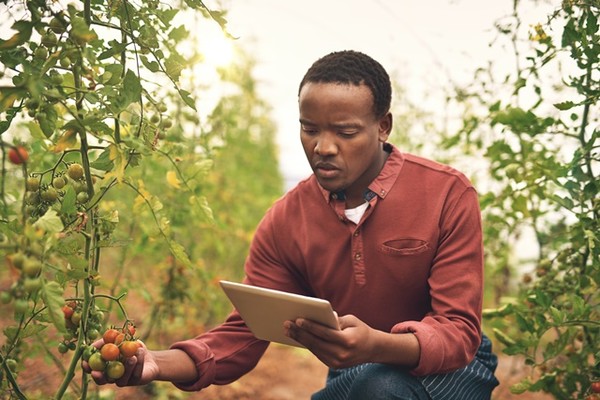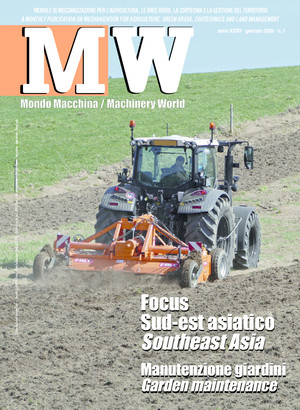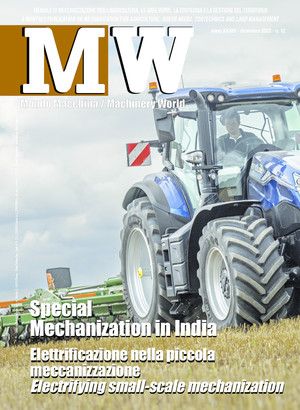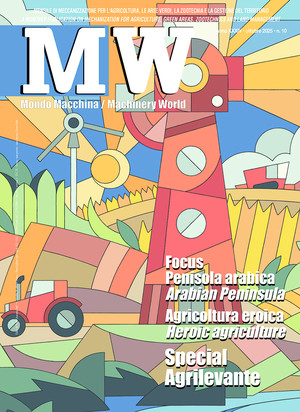
African agriculture: new leaderships and climate change
The most authoritative international observers report interesting transformations in the African economy, not least as a result of some new political leaderships. The agricultural and agro-industrial sector is at the center of the positive dynamics highlighted in some countries, even if the increasing presence of investors coming from the eastern countries for European companies is a variable to be dealt with. Climate change is more than ever a risk for the African agricultural economy, and research programs are already in place to develop effective cultivation systems and viable alternatives
The Africa Summit, annually organized at the beginning of October by the Financial Times LIVE, is always an important occasion to keep up to date on the economic and political development particularly of the sub-Saharan African countries. This is so also because it takes place in London where the ties with African entrepreneurs are much closer than in the rest of Europe (including France), and it is no coincidence that the Summit is often opened by the address given by a Head of State of one of those countries: this year it was the turn of two Presidents, Ghana’s President Dankwa Akufo-Addo, and Gabon’s President Ali Bongo Ondimba. Two countries that claim to combine political democracy with the diversification and development of their economy. Certainly some issues have been put forward for years, confirming that Africa still has to solve some structural problems that slow down its development, but once offset to the habitual, and sometimes repetitive, declarations of intent that characterize these events, it is possible to seize the new elements and the economic trends that are consolidating above all by actively engaging with the participants (African and non) at the Conference. Well, at least three main elements of novelty emerged.
The radical political change - Changing of the Guard - occurred in Southern Africa: South Africa, Angola and Zimbabwe. In these countries, the end of the long and controversial years in office of respectively Jacob Zuma (replaced by Cyril Ramaphosa), Jose Eduardo dos Santos (followed by Joao Lourenco JLo) and Robert Mugabe (followed by Emmerson Mnangagwa) is raising enthusiasm and strong expectations, first of all in these countries, and it will provide a highly novel element, not only in politics but also in the drivers of economy and development.
The second important aspect is the growing presence of Asian countries (therefore not only China) throughout the Sub-Saharan region. India, Turkey, the Gulf countries, Japan and South Korea are particularly active. They are a different kind of players from China, as they aim to a different form of economic cooperation to which our enterprises will maybe have to pay greater attention.
Finally, the attempt, which is becoming less and less unrealistic, to strengthen regional cooperation and the creation of a truly continental market. A declaration of intent often reaffirmed by political and economic leaders, but which today seems more concrete in the light of both the growth of a substantial middle class, especially in East Africa, and the interest of global companies, aiming at the consumer segment, to attack an appropriately sized market. Within this reference framework, In this framework, agriculture and the processing industry are at the heart both of the political interest (if only for the social impact on markets with strong demographic growth and with a large presence of farmers distributed in the area) and of delicate economic transformations and more.
The most dynamic countries
We can start from the case of Ghana, a country that has been defined by the leading international bodies as a virtuous case of economic growth and financial stability. After a less brilliant period, this year Ghana envisages a growth of 8.3% (estimates for 2018), being now a net exporter of electricity, chosen by Google to implement in Africa a development center for Artificial Intelligence. Yet, in this context, a dominant economic theme is to support the production of cocoa beans (together with the Ivory Coast the two countries make 65% of world production) but also to expand the food production base, and then start the industrialization of the agricultural sector.
Gabon instead - a country of rainforests and elephants (and oil) - addresses the agricultural sector following a different model now strongly supported by Asian multinationals: the development of palm oil production, now a commodity comparable to the oil.
The Olam International Group, very active in Africa (in 17 countries), deals with the palm oil. The practical reach on the African territory is ensured, among other things, by a tablet connection that all farmers share with the Singapore Headquarters. This is proof of how the digital revolution and innovation in the fintech are entering strongly in the agricultural sector of this continent, which tries to make up for the lack of physical infrastructures through the disruptive impact of digital innovation.
A significant boost on agriculture is foreseen above all in the countries of Southern Africa where there has been what someone has called a “change of the guard”. South Africa comes out of a period when there has been a dramatic fall in foreign investment, the local currency is under pressure and the new government intends to aim - as demonstrated by the South African Investment Conference 2018 held in Johannesburg from 25 to 27 October - above all to attract investments in the agro-industrial field.
In Zimbabwe, the target sector for agro-industrial investments will be tobacco production, which requires significant improvements both in terms of production processes and in cultivation and improvement of the seed quality.
Then, there are new players arising directly from the often conflicting political events of the Continent. This is the case of South Sudan, the youngest among the States as it was born on 11 June 2011, and that should definitely be no longer in the post-independence civil war phase through the signature, on 12 September 2018, of a peace agreement between the opposing factions. As well explained by Luris Mulla, the young and dynamic founder of the namesake consulting firm based in London, South Sudan aims at the economic level to make the most of its geo-economic connection with the six countries of East Africa (East Africa Community). The agriculture of this country, which benefits from a wide variety of climates and good availability of water resources, can represent an interesting opportunity for international operators. The sectors with the greatest potential, according to Loris Mulla Ltd, are cereal, sugar, the timber sector, and also the breeding and the fishing sectors. The call for cooperation concerns the entire supply chain: from the supply of services to that of machinery, including technologies for food storage and processing. The communication of this message is conveyed by a simple but effective invitation “Come and invest in South Sudan, the world’s newest investment destination”.
Climate risk
Going beyond the FT Africa Summit in London, the comparison with various international operators who are involved in various way in agriculture (traders, entrepreneurs, research centers and financial institutions), also raises a threat that is incumbent on this sector, which for some aspects could turn into opportunities for the African countries themselves: the climate change. A Potsdam Institute for Climate Impact Research’s study has highlighted the negative effects of an increase in temperature above 30° for some typical African products: wheat, soy, corn, coffee. In a scenario of global warming in which many experts explicitly speak of climate risk for the African agriculture (but clearly not only for this), perhaps the most obvious case is that of the Arabian-type coffee, which usually grows on the African and South American plateaus. For some years, due to the increase in temperatures, there has been a reduction in cultivable areas and the consequent abandonment of the coffee growing, replaced (depending on the countries) by other crops: cocoa, bananas, but also pepper, tapioca, and cardamom. There is also the strong development of palm oil cultivation that has to be taken into account in this framework, which in many situations has proved unfortunately extremely aggressive, in terms of deforestation and polluting effects. The climate change has a strong impact on the agricultural commodities sector, especially in Africa where it is already traditionally subject to the variability of the seasons (drought or meteorological phenomena) which leads to strong price fluctuations, pressures on transport costs and insurance costs, with not indifferent repercussions also on the social stability level.
It is, therefore, no coincidence that above all the financial system talks about climate risk (it is the one that must support trade in agricultural commodities that are not too different, as they are traded on the markets, from the oil). Aware of the change, considered evidently unavoidable in the short term, the financial-insurance system is also beginning to give preference to sustainable production through less expensive ad hoc instruments (a way to guarantee the containment of risks in international trade finance operations, so-called Trade Finance). For instance, a group of international banks actively cooperates with the World Coffee Research to analyze the global changes taking place in the cultivation and processing of coffee. Or, the decision of some banks and insurances to only support operations in the palm oil sector carried out by subjects adhering to the Roundtable on Sustainable Palm OIL Rules (which enjoys the support of the World Bank).
The trend seems to be clear, given that even the main global buyers of agricultural commodities - Unilever, Nestlè, Coca Cola - committed themselves, 2020 goal, to guarantee a supply chain ZND, acronym to indicate a “zero net deforestation” while Mars, Unilever, and Nespresso have invested in the Rainforest Alliance certification. An opportunity, and at the same time a necessity, for western and italian companies, is to deepen our knowledge of these dynamics, in order to support this transformation. In fact, in a context of agricultural products whose price is not able to catch up with the 2011 peak (compare FAO Index), the challenge is to offer services and products able to favor productive transformations and diversification, spread mechanization, enhance production processes, develop green technologies, provide assistance in the field of seed research. And as always - given the peculiarity of the Italian companies - provide solutions in the field of food processing, storage, packaging, and logistics.








